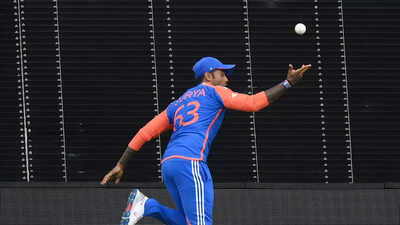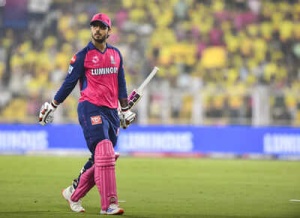The International Cricket Council (ICC) has unveiled a series of significant alterations to the playing conditions across Test, ODI, and T20I formats. These changes address crucial aspects such as over rates, ball management, boundary catches, concussion protocols, and wide ball rulings, aiming to refine the game and ensure fair play.

Umpires in discussion about implementing the new regulations.
To combat slow over rates, the stop clock rule, previously tested in white-ball cricket, will now be permanently integrated into Test matches. After an over is completed, the fielding team must commence the next over within 60 seconds. Teams will receive two warnings per innings, and subsequent violations will incur a five-run penalty. These warnings will be reset every 80 overs, coinciding with the availability of a new ball.
In One Day Internationals (ODIs), the usage of two balls will now be limited to the initial 34 overs. For the remaining 16 overs, the fielding side will have the option to select one of the two balls to continue play. This adjustment is intended to better manage the wear and tear of the ball.
The new boundary catch rule stipulates that fielders making airborne contact with the ball beyond the boundary must land entirely within the field of play to execute a legal catch. If a fielder steps outside the boundary and jumps again, they are allowed only one additional touch before landing inside the boundary.
Teams are now required to nominate concussion substitutes in advance. Any player diagnosed with a concussion must undergo a mandatory seven-day rest period before being permitted to return to competitive play. This measure prioritizes player safety and well-being.
A trial of a new wide ball rule will take place in white-ball cricket. The batter’s position at the point of delivery, rather than after any movement, will determine whether a delivery is deemed a wide. Deliveries passing between the leg stump and the extended protected area marker at the popping crease will no longer be called wide. However, balls passing behind the batter's legs may still be considered wide. To aid umpires, the protected area marker will be extended to the popping crease, serving as a visual guide.
The Decision Review System (DRS) will now utilize the actual physical outline of the stumps and bails to define the wicket zone. This enhancement aims to improve the accuracy of LBW (leg before wicket) decisions.
In addition to the existing five-run penalty for a deliberate short run, the fielding team will now have the authority to choose which batter takes strike for the subsequent delivery. This change aims to deter deliberate attempts to gain an unfair advantage.
In domestic first-class cricket, a player who sustains a serious on-field injury at any point after the match begins (including during warm-ups) can be replaced by a like-for-like player for the duration of the game. This rule ensures that teams are not unduly disadvantaged by unfortunate injuries.
The new Test playing conditions took effect from the Sri Lanka vs Bangladesh Test on June 17. The revised ODI and T20I rules will be implemented from the same series, starting with the first ODI on July 2 and the T20Is from July 10. All international matches occurring after these dates will be played under the updated regulations.
Newer articles
Older articles
 Ashada Gupt Navratri 2025: Unveiling Dates, Sacred Rituals & Hidden Significance of the Monsoon Festival
Ashada Gupt Navratri 2025: Unveiling Dates, Sacred Rituals & Hidden Significance of the Monsoon Festival
 Infrequent Bowel Movements: When Is It Time to Worry?
Infrequent Bowel Movements: When Is It Time to Worry?
 Royal Exit Strategy: Biographer Claims Financial Freedom, Brand Building Drove Harry and Meghan's Departure
OR
Harry and Meghan's Royal Exit: Biographer Uncovers Drive for Independence and Financial Gains
Royal Exit Strategy: Biographer Claims Financial Freedom, Brand Building Drove Harry and Meghan's Departure
OR
Harry and Meghan's Royal Exit: Biographer Uncovers Drive for Independence and Financial Gains
 New Zealand Cricket Announces Packed Home Schedule Against Australia, England, West Indies & South Africa
New Zealand Cricket Announces Packed Home Schedule Against Australia, England, West Indies & South Africa
 Beyond the Egg: 20 Vegetarian Foods Packed With More Protein
Beyond the Egg: 20 Vegetarian Foods Packed With More Protein
 Udaipur: India's "City of Lakes" Beckons with Palaces and Romance
Udaipur: India's "City of Lakes" Beckons with Palaces and Romance
 Toxic Workplace Alert: Spotting the Signs of a Negative Work Environment
Toxic Workplace Alert: Spotting the Signs of a Negative Work Environment
 Amazonian Scorpion Venom Yields Potential Breakthrough in Breast Cancer Treatment
Amazonian Scorpion Venom Yields Potential Breakthrough in Breast Cancer Treatment
 Nitish Rana Eyes Delhi Return After Disappointing Uttar Pradesh Stint
Nitish Rana Eyes Delhi Return After Disappointing Uttar Pradesh Stint
 Android Users Urged to Patch Now: Critical Security Flaws Expose Devices to Attacks
Android Users Urged to Patch Now: Critical Security Flaws Expose Devices to Attacks